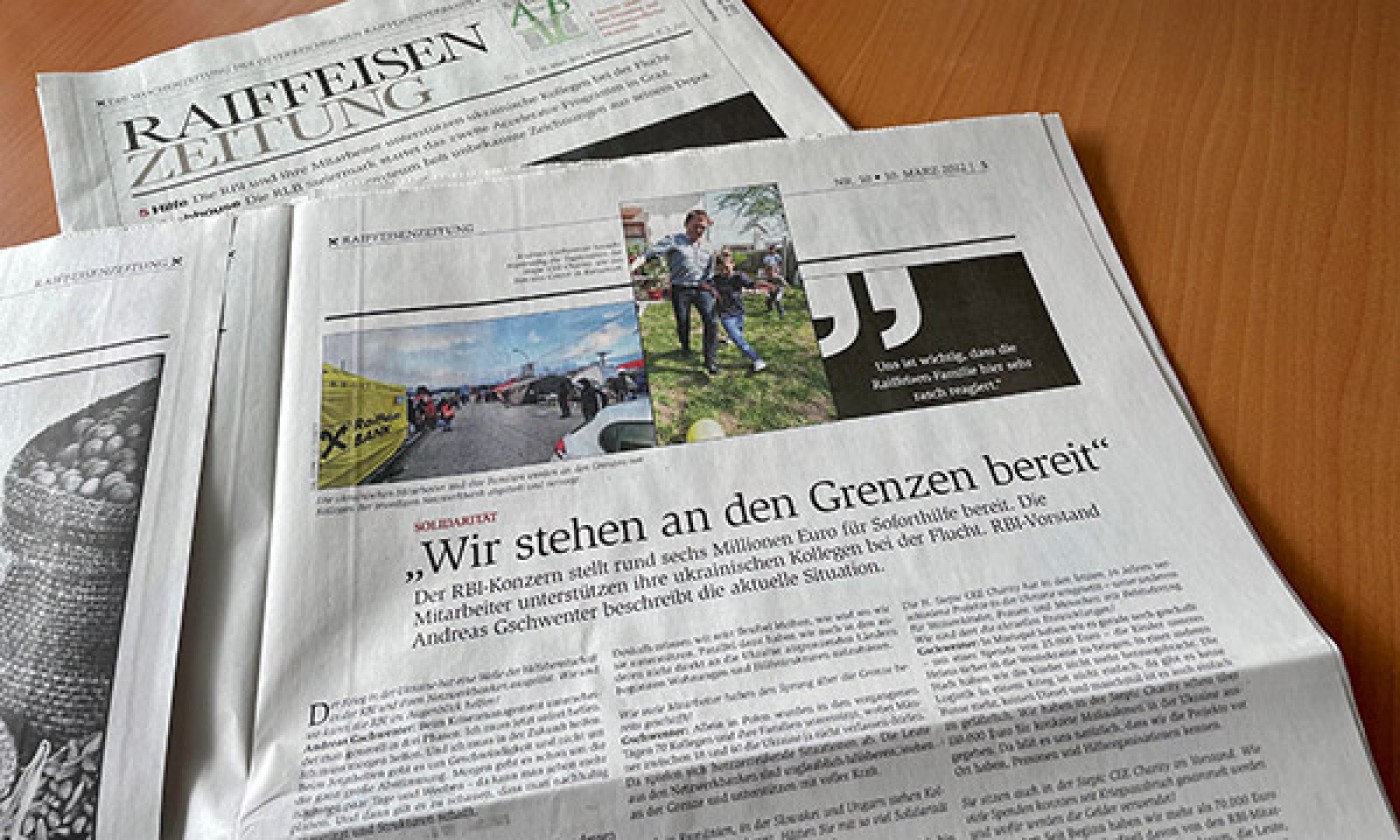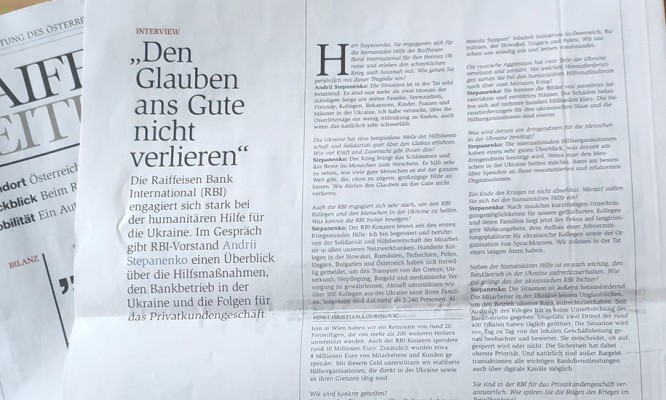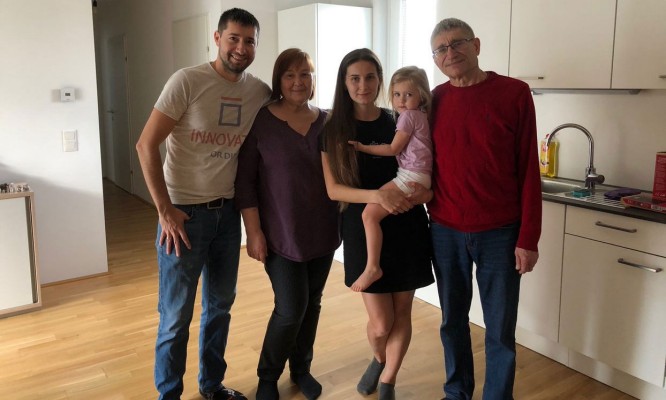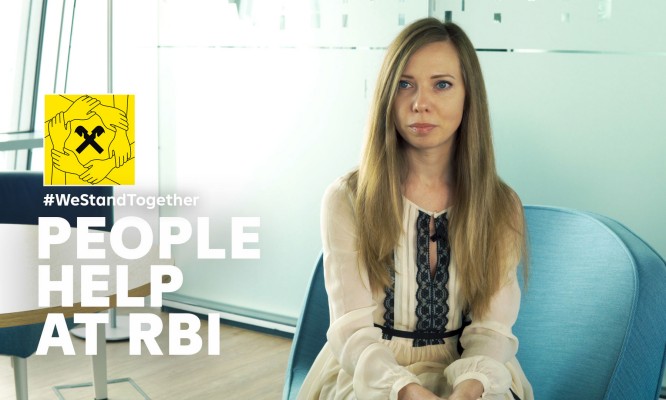10.03.2022, Raiffeisen Zeitung Interview with Andreas Gschwenter, Board Member at both RBI and Stepic CEE Charity
"We stand ready at the borders"
The RBI Group is providing around 6 million euros in emergency aid. Employees are helping their Ukrainian colleagues to flee. RBI Management Board member Andreas Gschwenter describes the current situation.

The war in Ukraine has triggered a wave of willingness to help at RBI and its network banks. How and where can RBI help at the moment?
Andreas Gschwenter: In crisis management, a general distinction is made between three phases: I have to help right now. I have to help tomorrow. And I have to help in the future. Helping now is about speed and not about the big coordination. Tomorrow is about the next few days and weeks – that's when you can plan more. And then you have to make sure that you provide sustainable support and create structures.
What does the help look like now?
Gschwenter: We were surprised by the war and especially its dimension. No one believed that the Russian army would go beyond eastern Ukraine. For us, it was important to react very quickly. We provided logistical support to our employees in Ukraine so that they could move from the east to the west. The local bank organized this very well. We knew where each employee was at all times. At a certain point, there were no more buses, but at least we knew where our people were traveling and when they would arrive in western Ukraine. There we gave them support, with housing and so on.
So it's primarily about escape aid at the moment?
Gschwenter: For us, it's about helping people and at the same time ensuring the operation of the bank. We are a very important infrastructure in Ukraine – to this day, payments are still working, and our customers can still use their ATM cards. On Friday, our colleagues in Ukraine managed to organize a bus that left Kiev with 60 people. We still have some employees in Kiev, although not everyone wants to leave the city. In the neighboring countries Slovakia, Hungary Romania, and Poland, where we have subsidiary banks and a branch, respectively, in Warsaw, the help was ramped up very quickly. We created communication and coordination. There was a clear goal: if an employee or his family crosses the border somewhere, they have to be picked up from there and taken care of by us. We don't want our staff members and their families crossing the border and then have no support. Through the organization in Ukraine and on the other side of the border, we can pick up our colleagues and their families when they cross the border. They receive initial care, get into a hotel or apartment, and financial support begins if necessary. The needs are quite different. Most Ukrainians cross the border on foot, stay in a hotel for a day or two and then continue their journey because they have acquaintances, relatives, or friends in Europe. For example, we provide support with logistics or establish contact with the respective local Raiffeisenbank so that our colleagues there can take over. In Poland, our Ukrainian colleagues tend to stay on site - but that can all change. That's why we have to remain very flexible in how and where we support them. In parallel, we have also started to set up homes and support structures in the other countries not directly bordering Ukraine.
How many employees have already made the leap across the border?
Gschwenter: In Poland alone, 70 colleagues and their families have been supported in the past few days, and men between 18 and 60 are not allowed to leave Ukraine. Heartbreaking situations are taking place. The people from the network banks are incredibly helpful, standing at the border and supporting with all their might.
Colleagues are also standing by at the border in Romania, Slovakia, and Hungary. Would you have expected so much solidarity among RBI employees?
Gschwenter: It's going further than I thought. I am positively surprised, and it is unbelievable how much commitment and self-initiative is happening. The commitment of our employees makes my colleagues on the Management Board and me incredibly proud.
How can the bank help its employees help?
Gschwenter: When employees drive to the border and pick up people, that's organized. There are structures, management, and budgets behind it. Apartments are rented and so on. Of course, it varies from country to country. We have large banks in Romania, Slovakia, and Hungary – they manage the aid from within their structure. It's a matter of "connecting" the fleeing colleagues and their families with the help on the other side of the border. However, we see most border crossings in Poland, where our smallest unit is with a few hundred employees. There we still have to build a parallel structure so they can handle those volumes. We are putting additional staff there to support our colleagues from Ukraine.
RBI has more than 6,000 employees in Ukraine. How many are on the run?
Gschwenter: We have 6,000 employees, that's right, with their families it's around 20,000. Ukraine has more than 40 million inhabitants and there are estimates that 4 million will leave the country. If I convert this figure to our Raiffeisen family, that would be 2,000 people. Of course, it depends on how the war develops. If it moves toward western Ukraine, then the numbers will increase. We have to be very flexible and are currently still with the now and the tomorrow.
How difficult is it to provide aid directly in Ukraine?
Gschwenter: Raiffeisen Bank in Ukraine has been approved a budget of 5 million euros to support the Red Cross in providing aid. With the Red Cross, we have a very reliable partner in Ukraine that can respond very quickly in cooperation with our bank.
The H. Stepic CEE Charity has implemented various projects in Ukraine over the past 16 years – including for orphans, women, and people with disabilities. What are the current developments there?
Gschwenter: In Mariupol, we just managed – with a donation of 25,000 euros – to bring the children from our orphanage safely to western Ukraine. In another city, we were unable to get the children out. The logistics in a war are not easy, there are no more buses, no diesel and sometimes it is just too dangerous. In the Stepic Charity we have already spent over 110,000 euros for concrete measures in Ukraine. It helps us, of course, that we have the projects on the ground and know the people and aid organizations.
You also sit on the board of Stepic CEE Charity. How many donations have been collected since the outbreak of the war and what are the funds used for?
Gschwenter: Since the beginning, we have collected more than 70,000 euros, the majority of which comes from RBI employees. The main thing is to provide good support for the people who come across the border and to set up structures so that we can help them sustainably in the future. This starts with food parcels and goes all the way to housing and pocket money. The money goes directly to the people without any deductions. We don't do a single project where our employees aren't involved.
The first refugees have also arrived in Vienna. How does RBI intend to help in Austria?
Gschwenter: In Vienna, we have already rented 50 apartments for three months, for which we are providing more than 75 .000 euros. As of the beginning of this week, more than 30 families with a total of more than 100 people were accommodated at locations provided by RBI colleagues. There is a whole package of measures in place at RBI, also with the strong support of our Staff Council. The initiatives of our employees form the basis, we coordinate them and combine them into a big whole. It is important to us that the Raiffeisen family reacts very quickly here and that the cohesion between the Ukrainian employees, their families and us fits. We are also currently evaluating how we can support children and young people in language courses, integration, and education.
All the development progress of the past years is being destroyed in Ukraine at the moment. What gives strength not to resign?
Gschwenter: We know the people. We know our 6,000 colleagues and we believe that this is an important moment to show what we as Raiffeisen can do for our community very quickly. The question of resigning doesn't even arise. I fear that more than four million Ukrainians will flee – but I am sure that Raiffeisen will make a big contribution here.





